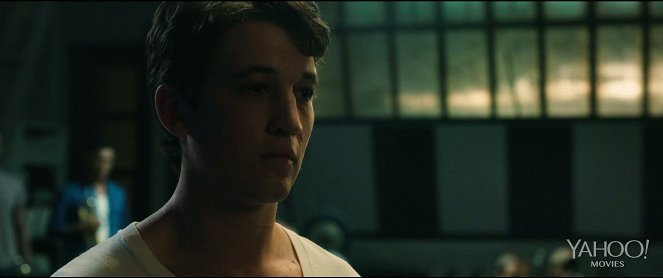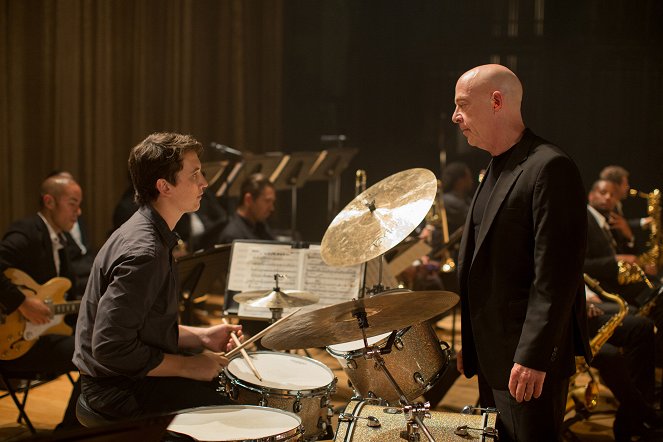Director:
Damien ChazelleGuión:
Damien ChazelleCámara:
Sharone MeirMúsica:
Justin HurwitzReparto:
Miles Teller, J.K. Simmons, Paul Reiser, Melissa Benoist, Austin Stowell, Nate Lang, Chris Mulkey, Damon Gupton, Max Kasch, Jayson Blair, April Grace (más)Streaming (3)
Sinopsis(1)
Andrew Neyman (Miles Teller) es un joven baterista de jazz, que solo tiene en mente estar a la altura para cumplir con las exigencias del elitista conservatorio de éxito al que asiste. Marcado por las vivencias de su fracasado padre, un escritor en ciernes, Andrew busca día y noche convertirse en uno de los grandes. Terence Fletcher (J.K. Simmons), instructor conocido por su talento para la enseñanza como por sus terribles métodos, lidera un grupo de jazz en la escuela superior. Fletcher descubre a Andrew y lo transfiere a su banda, hecho que marcará para siempre sus vidas. (Sony Pictures Esp.)
(más)Videos (5)
Reseñas (15)
Opakuji totéž, co jsem uvedl již u filmu Love song - filmů s hudební tematikou není nikdy dost, takže je pozitivní, že se natáčejí. Já osobně ovšem nejsem úplně cílová skupina, zvláště pokud jde o příběh mladého jazzového bubeníka, byť mě bubny od malička hodně lákaly. Já mám totiž u filmů nejraději silný příběh, téma, kvalitní scénař a bohatý děj. Vizuálním hodům a dokonalé formě se nebráním, avšak forma bude u mě vždy na druhém místě a to ve všech oblastech vnímání. V případě Whiplash nemůže být o nějakém bohatém ději vůbec řeč. Bubnuje se, bubnuje, tvrdě trénuje, bubnuje, bubnuje a bubnuje. Od začátku až do konce. Ani vztah mezi oběma hlavními protagonisty nemá tolik prostoru jako bubnování. Nicméně přesto musím uznat, že Whiplash nenudí a v druhé části dokáže diváka zaujmout a strhnout. Milles Teller podává solidní výkon, stejně jako J.K. SImmons - mně ale připadá, že si střihnul roli, v níž jsme ho viděli už mnohokrát, jen si možná dál o něco víc záležet a možná proto na tolik lidí působí nějak výjimečně. U mě ve srovnání s Edem ale nevítězí.
Konečně si z filmu odnáším hlavní poselství v podobě otázky k zamyšlení - stojí za to obětovat zásadní hodnoty jako lásku, přátelství, rodinu za jakoukoli kariéru? Jo a pokud bych měl Whiplash nějakého Oscara dát, tak rozhodně za střih - paráda!
()
Probablemente durante ningunos otros créditos finales haya deseado aplaudir con tanta insistencia como lo hice durante estos créditos. ¡Excelente película! Aunque no hay nadie con quien simpatizar, y Simmons en particular interpreta aquí solo a un monstruo humano un poco menos aterrador que Hopkins en El silencio de los corderos. El eventual Oscar por el sonido y montaje no nos sorprenderá, especialmente por el sonido, porque es la película musical hecha con más trabajo y cariño que ninguna otra.
()
A manipulative masterpiece. Actually, it has nobody to root for or to relate to – J.K.Simmons is almost a demonic caricature and Teller, with his drive to be the best of the best whatever the price, feels more like an unlikeable mule. But even with that, Whiplash is best enjoyed as an adrenaline ride where you can relish with how Teller hits those drums and Simmons screams and throws chairs at him. And then you don’t even notice those cheap crutches. 75 %
()
Spoilers ahead. Without psychologising and unnecessary plot digressions, Chazelle presents a chamber drama with the attributes of a psychological thriller whose rhythm is set by a confrontation between two very strong-willed sociopaths. The development of the narrative is as unpredictable as Fletcher’s teaching methods. As in jazz compositions, a brief release comes after the clashes escalate to the limit of a person’s physical capabilities and is soon followed by another dramatic crescendo. The way that Fletcher appears in a room, his predatory way of returning a gaze and the fact that we never see him in daylight are reminiscent of a monster from a horror movie. Under Fletcher’s influence, Andrew undergoes a transformation from a likable young man with big ambitions into a being that is as equally ruthless and indominable, a first-rate bastard, so to speak. While watching his development, we can ask whether extraordinary success must be preceded by submission and humiliation, the surrender of everything that makes us unique. In the end, Andrew may play without making mistakes, but he also plays without emotion or his own expressive feel. Does such music really represent the ideal self that he wanted to achieve? Chazelle doesn’t assert that it could be any other way in the competitive world of professional music. He doesn’t moralise or excuse the actions of either of the two main characters and, with the cynicism last demonstrated by Scorsese in The Wolf of Wall Street, he allows the two adversaries to devour each other. The film aptly references Rififi, which Andrew and his father go to see at the cinema. Like when committing a heist, there is no room for even a single ill-timed move when playing at the level Andrew desires. All parts of the body must be perfectly synchronized. It is not about the audience, but about the feeling of having full control over oneself and (essentially male) superiority over everyone else who fails to achieve the same level of precision. Like Fletcher and his obsession with tempo, Chazelle prides himself on flawless pacing. The film’s editing corresponds to the frantic drumming. The scenes set in the rehearsal room are precisely rhythmised according to Andrew’s drum hits and Fletcher’s assaults, thus transforming their (mostly) non-contact struggle into a brutal physical battle. The quick cuts between the close-ups of the musical instruments and the shots of body parts also create an effect evoking the merging of the musician with his instrument. Andrew literally lives his music. It characterises him and lends him a voice that can be heard. Therefore we hear it at the beginning before we even see the protagonist for the first time. The frenetic editing combined with the camera penetrating into the most intimate zone of the characters turns Whiplash into a very physical, horror-like experience. In a few places, the frontal assault on the senses has to be subordinated to the plausibility of the plot, into which several coincidences were not very artfully incorporated (the loss of the sheet music after Fletcher warns the musicians to guard it with their lives, the breakdown of the bus after Fletcher emphatically warns everyone to be on time for the concert). Due to the precedence of the visceral experience over probability and psychological motivations, this is not a drama of astonishing complexity, but I thoroughly enjoyed Whiplash as a thriller (on the big screen!). 80%
()
(menos)
(más)
The film may push the despot-pupil relationship a little too much, but there’s no better demonstration in recent years that talent alone is not enough; that talent, not nourished by daily grind, immeasurable diligence, focus and a desire for maximalism, regardless of the obstacles, is actually useless. Because as J.K. Simmons says “There are no two words in the English language more harmful than ‘good job’.” Fuck "good job", geniuses must want more. The last time I experienced similar feelings was with the 1961 film The Hustler, with Paul Newman, which says the same thing about talent, though in a completely different industry. The message of this film is more or less clear and it doesn't matter if it is about drummers, violinists, billiard players or tennis players, its insight about Talent is universal.
()



Anuncio